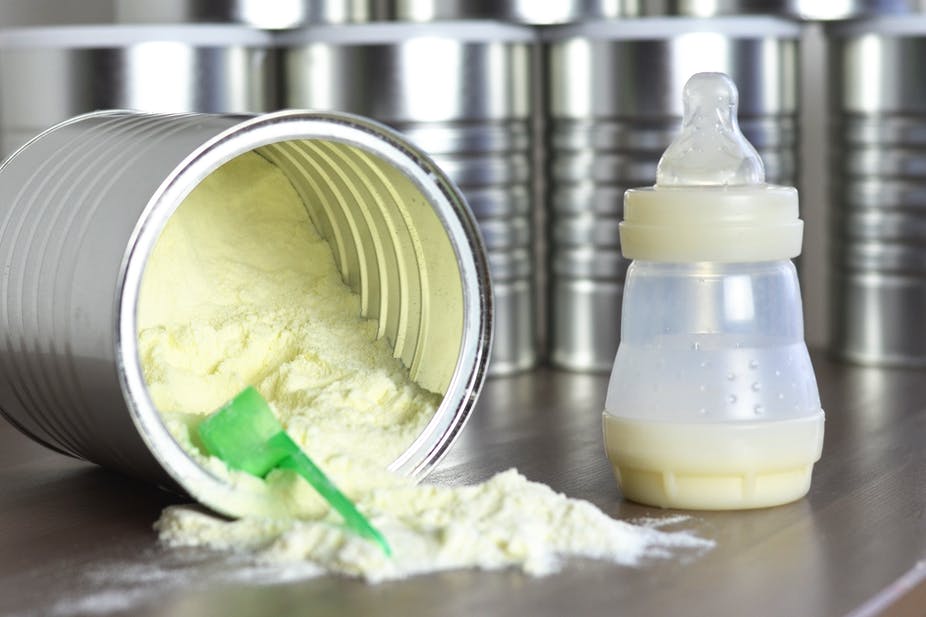‘We’re no different than anywhere else:’ Quincy stores, agencies struggling to keep shelves stocked with baby formula

QUINCY — The country has faced an unbelievable amount of product shortages since the start of the pandemic in March 2020 — toilet paper, appliances, furniture, computer chips, you name it.
The latest shortage gaining national attention is baby formula, but this shortage isn’t completely pandemic related.
The largest U.S. manufacturer of baby formula, Abbott Nutrition, shut down its largest production facility in Sturgis, Mich., in mid-February. The New York Times reported company closed the factory after four babies — all of whom had drunk formula made there — contracted a rare bacterial infection. Two of the babies died.
Abbott also recalled several lines of formula products after learning of concerns about contamination issues. The plant remains closed, but Abbott hopes to return to manufacturing product in a few weeks pending FDA approval. Once the facility reopens, product is not expected to hit shelves for close to two months.
The federal government is taking steps to help bolster production by cutting red tape to promote faster delivery to shelves, cracking down on price gouging and looking at manufacturers outside the U.S.
Based in Washington, D.C., Datasembly provides access to billions of grocery and retail pricing records from every store at hundreds of retailers. The baby formula stock was relatively stable for the first half of 2021, with out-of-stock fluctuation between 2 and 8 percent. The out-of-stock detail shows that baby formula shortages hit 30 percent in April 2022 and jumped to 40 percent by the end of month.
The nationwide out-of-stock percentage was at 43 percent for the week ending May 8.
Quincy is seeing similar results. Tad Gallagher, district manager at HyVee on Harrison, say the variety of available formula is thin.
“Mainstream product lines are hard to get,” he said. “We are not different than anywhere else. Supply is not good.”
County Market is no different.
“We don’t have the stock levels that we would like to have, but we do have products on the shelves and the supply chain is not broken. Product is coming in,” said Gerry Kettler, director of consumer affairs for Niemann Foods, Inc.
Kettler believes consumers will have a say in stock levels.
“(Supply will depend on) consumer behavior,” he said. “What a lot of stores are doing … they’re putting certain limits on (purchases). That kind of evened out the supply for it, so that way everybody can get some.”
The less fortunate often are the ones most affected when supplies are short. However, at least in Quincy, so far, so good.
“If anyone needs formula, we don’t always have all of the varieties, but we’re willing to help with anything we do have,” said Ginny Mueller, food pantry manager for QUANADA (Quincy Area Network Against Domestic Abuse), which provides emotional, physical and crisis support for those who have been assaulted or abused. “I just haven’t run into having a shortage of it yet, but it is something I’m being mindful of.”
Callie Asmann, a Blessing Hospital international board-certified lactation specialist, offers advice to people struggling to find supply.
“We want to get the message out to moms that, if you don’t have enough formula, either contact the Adams County Health Department, or they need to get a hold of their pediatricians,” Asmann said. “They’re going to have resources to get (formula) if somebody truly can’t get some formula.”
For expectant mothers, Asmann’s message is simple: Breast feed if you can. Blessing has resources to help mothers with difficulties breastfeeding.
“We do have prenatal breastfeeding classes at Blessing Hospital that are free, and we also have weekly breastfeeding support groups,” she said.
Miss Clipping Out Stories to Save for Later?
Click the Purchase Story button below to order a print of this story. We will print it for you on matte photo paper to keep forever.

